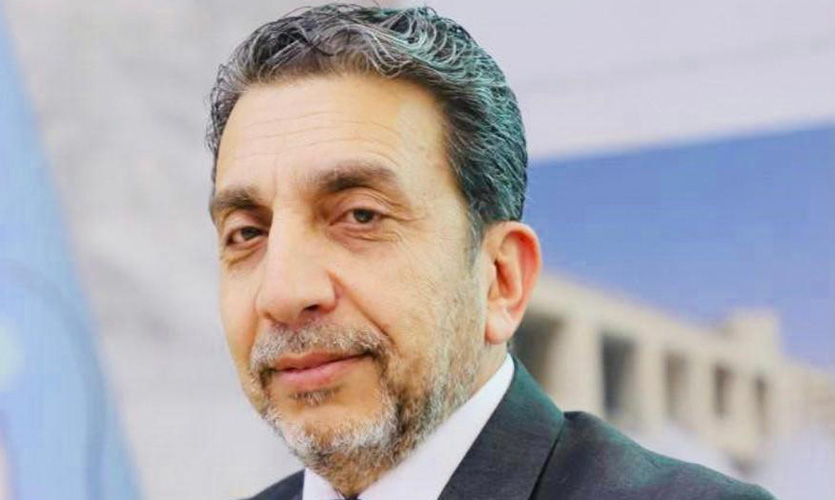Professor Dhiya Al-Jumeily OBE

Dhiya’s academic journey began back in Iraq where he grew up, gaining his first degree in mathematics at the University of Baghdad in 1988.
Seeking to expand his horizons, he embarked on an academic pursuit that led him here to the city of Liverpool, where he acquired his master’s in software engineering from the University of Liverpool in 1992.
Professor Al-Jumeily briefly lived in London, Manchester and Liverpool for a week each before making his final decision on where exactly he wanted to study in the UK. “I chose Liverpool due to its friendly environment and welcoming people. Also, I have been a Liverpool Football Club fan since childhood, and I was keen to study in the city that hosted it.”
After studying up the road, Dhiya’s passion for education next brought him to LJMU where he completed an MPhil in Computer Science in 1995 and a PhD in Intelligent Software Development in 2000. These formative years equipped him with a deep understanding of the theoretical principles and practical applications in computing and mathematics, laying the groundwork for his groundbreaking contributions to the field of Artificial Intelligence (AI).
Professor Al-Jumeily has made significant contributions through his expertise in AI to advancements in medicine, virtual and augmented reality and the environment. He has published more than 350 peer-reviewed international scientific papers, along with 17 books exploring multidisciplinary research areas such as machine learning, telecommunication fraud detection, AI-based clinical decision-making, sensors, robotics and wearable intelligent devices.
Alongside his own research, Dhiya has shared his expertise with students studying at LJMU’s School of Computer Science and Mathematics, successfully supervising over 25 PhD students, nurturing the next generation of researchers and fostering the growth of AI expertise within the academic community. He has also served as Associate Dean of External Engagement for the Faculty of Engineering and Technology and as a staff governor for the Board of Governors.
But aside his success in the UK higher education sector, Dhiya has never forgotten his connections to Iraq, and the philosophers and scholars who laid the groundwork for the field of AI centuries ago.
“Algorithms themselves were first discovered by Al-Khwarizmi at the House of Wisdom in Baghdad in the 9th century. Thus, ‘algorithms’ (khawarizmiyat) were named after this scholar and have always been the basis of Artificial Intelligence analytics that have flourished lately in the fourth industrial revolution.”
“I chose Liverpool due to its friendly environment and welcoming people. Also, I have been a Liverpool Football Club fan since childhood, and I was keen to study in the city that hosted it.”
– Professor Dhiya Al-Jumeily OBE

He collaborates closely with Iraqi scholars and has developed intelligent applications in Iraq and other countries worldwide, benefitting patients and contributing to national and international organisations and governments. Recently, his attention has shifted towards addressing the pressing issue of water scarcity in Iraq, which has been exacerbated over the last decade.
“Iraq is one of these areas where the two main rivers have been facing declining water levels due to increasing temperatures, drop in rainfall, construction of upstream dams and droughts. This is a big concern, especially since water is the most essential element of life.”
His cutting-edge research in AI is supporting the development of sensor technologies that will monitor, predict and control the water levels and seek out pollutants while also looking at how Iraq can use its water supplies from lakes and reservoirs to generate energy.
“When AI is combined with advanced tools, such as floating solar panels, many problems are solved. The floating solar panel will prevent the water from evaporating from Iraqi reservoirs and lakes, generate electricity, and increase its efficiency where the water will protect the panel from dust and overheating. The approach generates clean and sustainable energy.”
Professor Al-Jumeily firmly believes this technology-driven approach could address pollution challenges, enhance access to food and clean water, combat non-communicable diseases, provide sustainable energy solutions and boost the national economy.
It is for his innovative ideas like this in Iraq that he was awarded an OBE by Her Majesty The Queen in 2020, acknowledging his outstanding services to scientific research over many decades, and particularly to the field of AI.
He is also a Senior Member of the Institute of Electrical and Electronics Engineers (IEEE) and a Chartered IT Professional.
“I am looking forward to more breakthroughs and global benefits of AI applications in the coming years. More specifically, I am looking to advance AI analytics in multidisciplinary and cross-disciplinary areas to fulfil the United Nations Sustainable Development Goals.”
